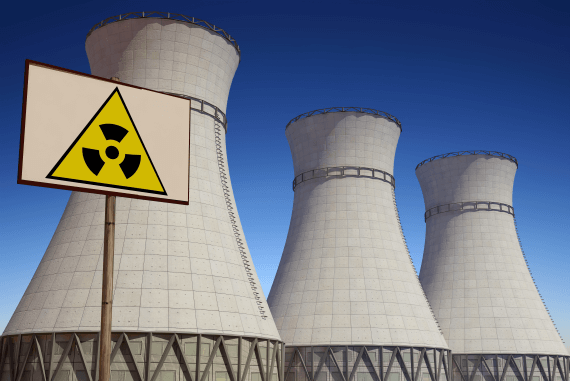- Home ››
- Health and Safety Training ››
- Environmental Health and Safety ››
- Energy ››
- Nuclear Power
Nuclear Power
Introduction

Nuclear energy is one of the most controversial methods of energy generation in terms of the protests and objections it receives. This is because the effects of an accident can be extremely serious, putting the health at risk for people and living creatures over a wide area for many years, potentially causing death and serious illnesses such as cancer for those affected by radioactive fallout. High profile disasters such as Chernobyl and more recently Fukushima have made many people fearful of nuclear power and vehemently against the siting of a nuclear power plant anywhere near them.
This fear is unfortunate, as when everything operates correctly, nuclear energy is actually one of the most preferable methods of generating electricity. Like renewable forms of energy there are no environmentally-harmful emissions produced like there are by power stations which burn fossil fuels such as coal, oil or gas. However, whilst renewable energy sources often require huge numbers or amounts of equipment to generate electricity in any meaningful amounts, nuclear power stations can produce great quantities of electricity.
This is because the energy produced through nuclear reactions is so powerful, but is also what makes it so volatile and dangerous when things go wrong. Therefore one of its greatest advantages is also one of its biggest dangers.
Supply and Disposal of Nuclear Material
Another benefit of nuclear power is that unlike supplies of coal or oil, the quantity of uranium and nuclear fuel is much greater in terms of how many more years it can be used as a fuel source. This makes the construction of nuclear power stations more financially viable in terms of building for the future than fossil fuel burning power stations.
Along with the potential for explosions and disasters, the other significant drawback associated with nuclear power plants is that spent fuel rods remain radioactive - and as such extremely damaging to the cells of organic matter - for an extremely long period of time i.e. hundreds of years. This means it is extremely important that they are disposed and stored securely and correctly so that they will not pose a danger to the health and safety of anyone.
Highly Trained Workforce
The potential dangers and hazards mean that operating a nuclear power plant safely requires a highly trained workforce which can carry out duties effectively and correctly. Whilst any place of work contains dangers which can put at risk the health and wellbeing of workers and nearby members of the public, nuclear power stations are extremely high-risk places of work. As a result, workers will need to have received comprehensive training in a variety of issues such as how to operate equipment correctly and relevant health and safety training to not only keep themselves safe, but also their colleagues and everybody living and working in the vicinity.
Performing repairs and maintenance on certain parts of the nuclear power plant such as the reactor core will require highly-trained specialised personnel who know exactly what they are doing, as a mistake or insufficiently-performed job could prove fatal.
The Expense of Building and Maintaining
Any type of large-scale power station is expensive to build, but a nuclear power plant is one of the most costly to both build and maintain, again primarily due to the safety controls that need to be in place to prevent a catastrophic disaster or even just to protect workers as they go about their day-to-day duties, as even low-level exposure to radiation over an extended period of time can cause serious health issues such as radiation poisoning or cell mutations to occur.
Use of Materials to Construct a Plant
Related to the expense talked about in the paragraph above is the amount of materials required to construct the plant, in particular the large quantities of steel and concrete needed to build and reinforce certain areas of the plant in order to keep workers safe. Not only are these materials expensive to purchase for use in the construction, but the process of manufacturing them usually produces large quantities of harmful gas emissions which can be damaging for the environment, which ironically is somewhat in contradiction to the environmental benefits of nuclear power generation as opposed to fossil fuel burning power stations.
Necessity of Nuclear Power in the Future
Despite the opposition, there is little doubt that nuclear power is essential for the future electricity generation needs of countries as supplies of fossil fuels become increasingly scarce and are exhausted over the next century or so. Whilst renewable forms of energy generation are making a significant contribution to the total energy demands of developed nations, at present they cannot produce the quantities of electricity needed for it all. As an example a wind farm would need to have huge numbers of turbines erected over vast tracts of countryside in order to generate anything like the amount of electricity as one relatively small coal-fired power station. This would not only be astronomically and prohibitively expensive but would be impractical in terms of the land space required, not to mention the protests from the many people likely to be affected by all these turbines.
With renewable sources of energy unable to make up the deficit which will be created by the gradual dwindling of electricity supply from fossil fuel power stations, nuclear is currently the only real alternative to generate the quantities of electricity demanded by households and businesses. Even with moves towards greater energy efficiency such as the phasing out of traditional light bulbs to energy efficient ones demand will still outstrip supply if only the current forms and scale of renewable forms of electricity generation existed. This means that without development of equipment which can generate power in greater quantities, or without taking up vast tracts of land through installation of much more equipment and machinery to harness natural energy, then nuclear energy is here to stay despite the risks and opposition to it.
Nuclear Power to Weapons
An issue facing the world community is that as well as the nations who have been operating nuclear power plants for decades come to terms with the running out of fossil fuels, so too will other countries who must also find alternative methods of generating their electricity. Many will turn towards nuclear power, but unfortunately the nuclear material needed to fuel the reactors can also be further refined to be used in creating nuclear weapons. The damage that can be inflicted from nuclear weapons in terms of death, ill health and destruction means that a careful watch needs to be kept on who is building what. However, this may also mean attempting to prevent them from building nuclear power plants, which raises political debates and questions regarding how much of a right some countries have over others in terms of whether they should be allowed to construct nuclear power stations or not.
The furore created by Iran's drive to produce electricity from nuclear fuel, and the suspicion that it might be used in weapons, is probably only the beginning of many more political arguments as more and more countries seek to satisfy their energy demands through nuclear methods.

